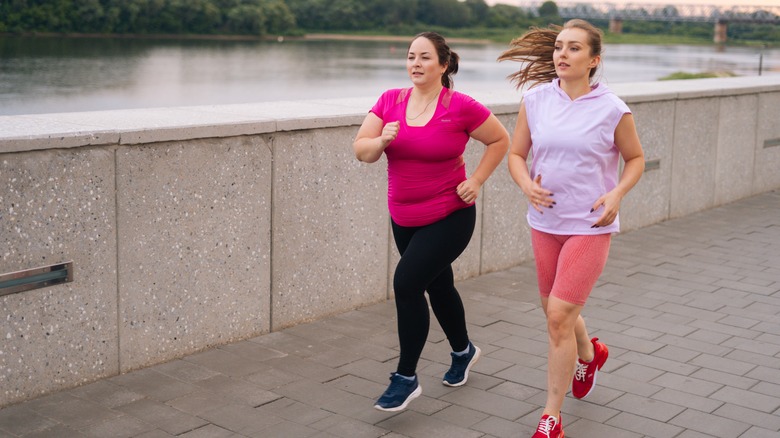What Aerobic Exercise Can Do For Your Cancer Risk
Cancer is pervasive in our modern society, with 39.5% of Americans diagnosed with it at least once in their life, according to the National Cancer Institute. But we also know there are some things we can do to prevent cancer, like wearing sunscreen, staying away from tobacco, reducing our alcohol consumption, and maintaining a healthy weight, per the Centers for Disease Control and Prevention (CDC). Getting physical exercise can also help reduce our risk of cancer, and new research explores exactly how this works.
The Office of Disease Prevention and Health Promotion recommends that adults get a minimum of 150 to 300 minutes of moderate aerobic activity each week, such as walking briskly or jogging. They also recommend that adults do strength training activities, like push-ups or weight lifting, twice a week. This physical activity benefits us in a number of ways, like reducing blood pressure, improving sleep, reducing anxiety, and improving insulin sensitivity. And when these activity guidelines are met consistently in the long term, we know that it can help prevent cancer, specifically bladder, kidney, lung, stomach, breast, and colon cancer.
How exercise may deprive cancer cells of fuel
In a 2022 study published in Cancer Research, researchers analyzed data from 2,734 people over 20 years, finding that compared to those who were sedentary, those who did high-intensity aerobic workouts regularly had 72% fewer cancers (via Healthline). This included exercises like running, swimming, cycling, and rowing. It was suggested that this type of aerobic exercise causes the body to use glucose from internal organs, which can effectively deprive cancer cells of fuel. This can not only help reduce the risk of cancer, but also help prevent it from recurring in those who have already experienced it.
The Office of Disease Prevention and Health Promotion suggests that even making attempts to sit down less and move around more can help improve your health. But high-intensity aerobic exercise, the type used in the study, typically means that your breath will feel rapid and deep, you won't be able to talk much without stopping for a breath, and you'll begin sweating after just a few minutes (via Mayo Clinic). Moderate intensity aerobic exercise, which is what's recommended 150 to 300 minutes per week, usually means you'll feel slightly out of breath, can still carry on a conversation, and will begin to sweat lightly after about 10 minutes.
But any type of exercise can still be beneficial, according to Healthline. Do what feels sustainable and works for you, such as jumping on a trampoline, dancing, riding a bike, or going for a walk.


